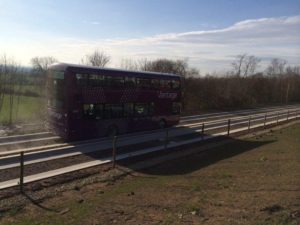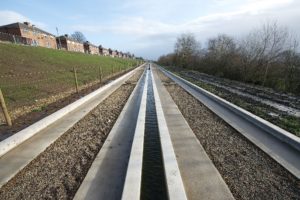Leigh to Ellenbrook Guided Busway
Client: Transport for Greater Manchester
Contractor: Balfour Beatty
Specialist Subcontractor: Extrudakerb
Designer: Atkins
The North West Sustainability Project of the Year seeks to reward a project where the principles of sustainability have been fully embedded, particularly those that demonstrate creative and innovative thinking and leadership.
The Leigh to Ellenbrook Guided Busway project:
- Is a completely unique civil engineering project, implementing techniques which have not been used in the UK before. Learnings from this project will be used to benefit future busway schemes;
- Had sustainability as a central consideration: in design, during construction and through the benefits delivered by the completed public transport system;
- Embedded all three pillars of sustainability to deliver long-term social, environmental and economic benefits.
In a first for the UK – the team implemented an innovative slip forming technique for the busway, using diamond tip grinding to achieve the challenging tolerances of +/-1mm. This saved £7.2m and provided a higher quality end product.
Water consumption was reduced by 90% during grinding using a sustainable solution to recycle waste water.
The new busway will improve environmental, social and economic prospects as a major investment in long-term regional growth, providing:
- A cross-city service, with eight bus services starting each hour and around 50 minutes journey time to the city centre, up to 30 minutes quicker than peak hour timetabled services;
- Improved connectivity to employment/leisure areas and retail;
- Potential to reduce vehicle volumes on the A580;
- Minimal environmental impact due to super low emission buses with Euro6 Hybrid engine technology.
Sustainable innovation and best practice during construction included:
- 11,130 wagon movements avoided by optimising material use;
- 83,500m3 of material diverted from landfill through value engineering;
- 72,000 tonnes of material donated to create new community woodland;
- £14m spend with SMEs and £6m spend within 30 miles;
- Around 25,000 new trees planted and 3,000 amphibians protected and dedicated ponds and tunnels constructed.


